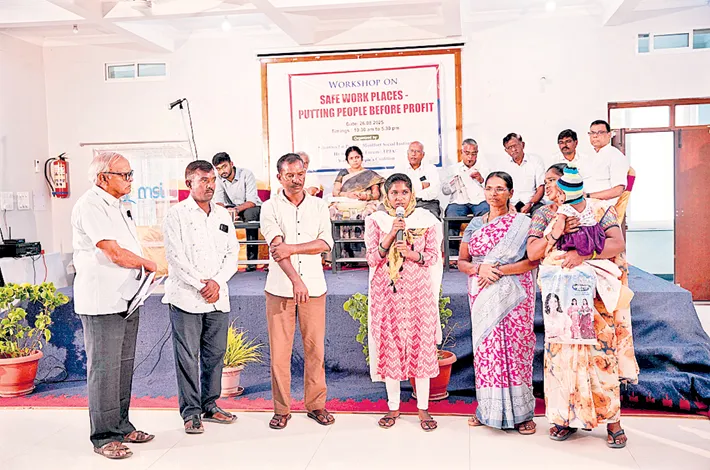Civil groups push for ‘industrial manslaughter’ laws
27-08-2025 12:00:00 AM

■ Call for industrial manslaughter laws to punish unsafe industries.
■ Over 50 killed in Sigachi blast, families still awaiting justice.
■ 135 deaths, 370 injured in Telangana’s factories since 2023.
■ Experts slam outdated laws and weak political will.
Metro India News | Hyderabad
Civil society groups have demanded the introduction of “industrial manslaughter” laws in Telangana to hold factories criminally liable for worker deaths. The call comes in the wake of the June 30 explosion at Sigachi Industries in Pashamylaram, which killed more than 50 workers and left several still missing.
At a workshop titled “Safe Workplaces – Putting People Before Profit” held at Montfort Social Institute on Tuesday, families of victims shared painful stories. One relative said, “We did not even get mud,” referring to the absence of their loved one’s body, while another described the agony of watching a family member die after severe burns.
Speakers accused industries of treating human lives as expendable. Environmental expert Dr. Sagar Dhara called the repeated disasters a form of “slow genocide,” while activist Jagdish Patel stressed the need for “industrial manslaughter” laws to ensure accountability.
Human Rights Forum (HRF) member Jeevan Kumar revealed that between 2023 and 2025, 135 people died and 370 were seriously injured in industrial accidents around Hyderabad. “Factories don’t provide even basic safety. It is high time we hold both government and institutions liable for these failures,” he said.
Brother Varghese Theckanath of MSI criticized the prioritization of ease of doing business over safety. Retired IICT-CSIR scientist Dr. K. Babu Rao said the recurring incidents amounted to “avoidable manslaughter” and questioned the political will for reforms. Another scientist, Dr. P.G. Rao, urged shared responsibility between management and workers.
Legal expert Akhil Surya argued that outdated frameworks like the Employees Compensation Act, 1923, and recent labour codes weaken safety protections by centralizing authority and reducing state power. He warned that ex gratia payments should not be a substitute for real accountability.
The workshop also condemned delays in compensation, demanding immediate full payments, stronger regulation, transparent reporting, worker participation in safety decisions, and long-term support for families and migrant workers.Concluding the meet, organizers vowed to continue campaigning, declaring: “Safety is everyone’s responsibility, and people’s lives must come before profit.”








